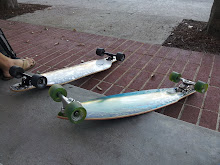One of the major things I got out of the Miller book was the idea that commercialized music was integrated into "folk" music, or southern music, rather than the other way around, of the Powers That Be appropriating "authentic" or "folk" music. I actually thought it would be the second way, although when one thinks about it, given the proliferation of commercialized music, it is not surprising that southern music would be influenced by commercialized music. It was interesting that Charles Peabody was dismayed to hear African American laborers singing commercialized "white" music coming from New York City - in that it exemplified the sentiment of the Jim Crow laws, wherein Powers That Be (usually white) wanted to put race and genres and music in separate boxes. The bleed-thru of commercial music into "folk" music, then, seemed to threaten the sacred tenet of segregation on which the Jim Crow laws are based, and hence threaten the hegemonic power of white folks. (who are, at the end of the day, still "folks" - more on this later) Genres have always really bothered me. It seems to seek to put art and artistic endeavors (music, film, TV, etc --- and people, as we see) in these tiny boxes. They put unnecessary boundaries and limitations on human expression, and seek to categorize and organize in order to control. We see this with film and TV genres all the time. Especially with the Emmys, what is "good" and what is "bad" is often based on genre - this is a "good" drama show, this is a "good" comedy show, and we will reward you for falling within the lines of genre, award shows tell us. Race, then, as Miller demonstrates, is an ultimate genre that then gets tied closely with art produced by racialized bodies. It is a type of genre that comes with even more historical power struggles than the genre to which I previously referred. Both, of course, are constructed, and are sites of power struggles. This idea of racialized genres is still prevalent in music today, although it seems less imposed upon by Powers That Be and more simply part of the hegemonic fabric of our society that comes from a history of slavery and oppression of non-white people. Broonzy's quote "all music is folk music" in the afterword of the book is poignant on many levels. On one level, he speaks of the challenges (and possibly inanity) of trying to categorize folk music, of trying to categorize what is "authentic." On the other hand, I feel he makes a much broader statement about race and the perceived inferiority of African Americans or non-white musicians. He seems to react to the fact that non-Whites, and especially African Americans, were treated no better than animals, if we recall the slavery era. His comment about the horse speaks to this very clearly. This statement is poignant because it recognizes the dehumanization of black folks in the south, and seeks to bring an aspect of humanity back into the conversation, to remind people that, regardless of race, everyone is foundationally human. One more quick anecdote that I won't elaborate on too much (might be able to link it later to another blog), but I thought was relevant to this idea of racialized music. My friend Dawen performed at the Apollo in NYC last week. Did not win, but is interesting in that he's a guy of Asian decent playing soul music. Dawen's genre is R&B, another "traditionally" black genre. I've often wondered if Asian American musicians have a genre of music, or if we just bounce around, adapting other racialized genres?
Subscribe to:
Post Comments (Atom)




No comments:
Post a Comment